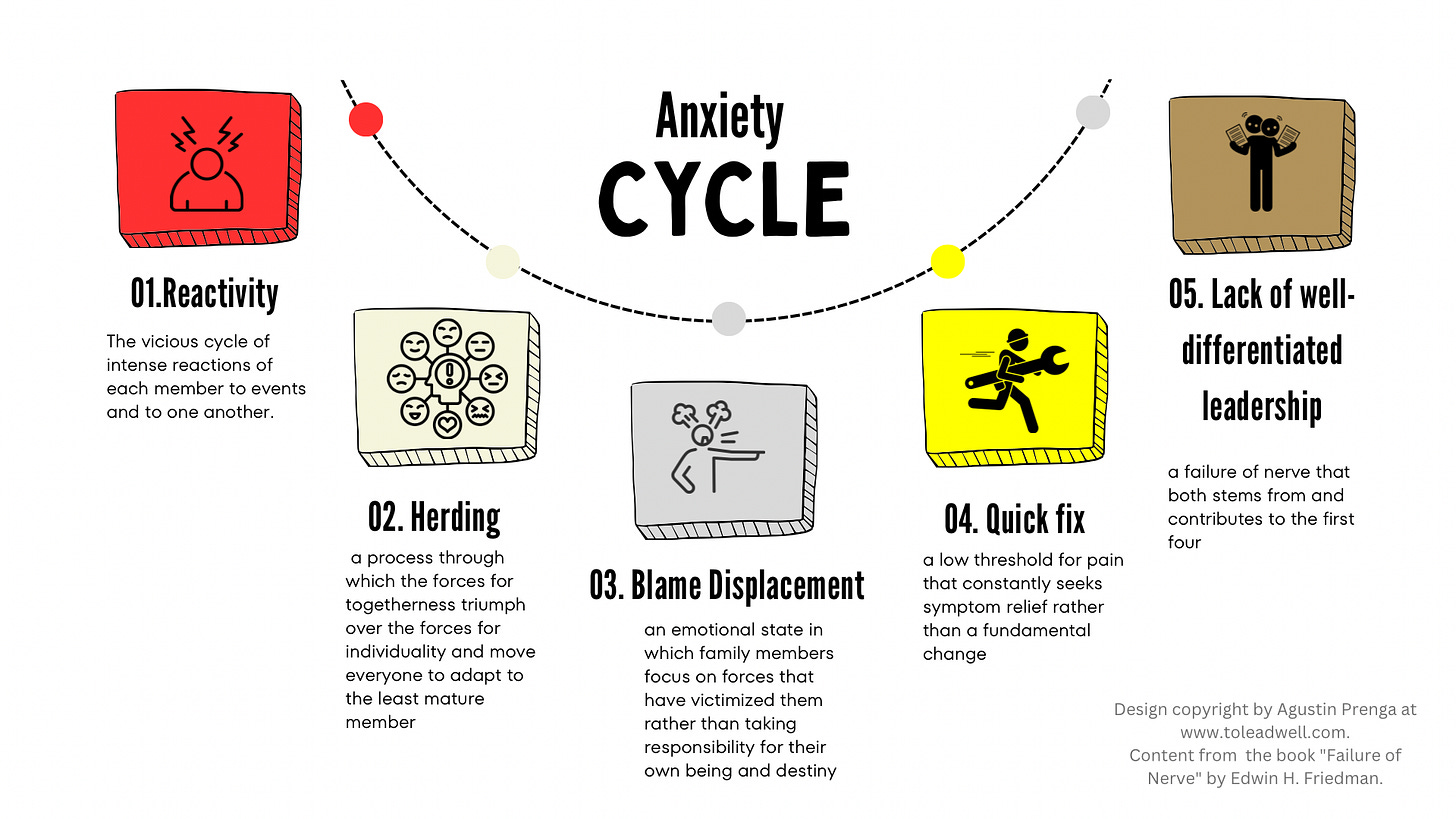Transforming Leadership in an Age of Anxiety
Explore how anxiety cycles affect leadership effectiveness
A Modern Tale
A leader sat in his office, feeling the weight of his responsibilities as he tried to talk via Zoom with a struggling college friend. He closed the door to ensure privacy and leaned back in his chair, attempting to offer comforting words. However, his mind wandered, and he reached for his phone.
As he scrolled through his news feed, a headline about a devastating tragedy on a faraway continent caught his eye. His heart sank, but he pushed the news aside, reminding himself to focus on his immediate responsibilities.
Before leaving his office, he decided to check his emails. Skimming through the recent ones, his adrenaline spiked when he recognized the subject line from a colleague who had undermined his leadership for months. Frustration simmered beneath his composed exterior as he hurriedly gathered his things and headed home.
When he walked through the door, his wife asked him, "How was your day?"
But before he could answer his wife, also overwhelmed, vented her frustrations, inadvertently taking out the stress of her day on their kids. The leader's youngest child came running to him, tears streaming down her face. He was sitting on the couch, trying to lose himself in a football game where his team was losing.
He looked down at his crying daughter and then over at his wife, who was still visibly upset. At that moment, he realized the cycle of stress and frustration that had enveloped their family. Taking a deep breath, he turned off the TV and pulled his daughter into a comforting hug.
"Hey, it's okay," he whispered, kissing her forehead. "Let's talk about it."
He stood up and walked over to his wife, gently taking her hand. "I know it's been a tough day," he said softly. "Let's sit down and talk, all of us together. We'll get through this."
"How?" she replied. "You are always drained when you come home. You need help for yourself."
Involuntarily, he nodded his head. "I've noticed that. I want to understand how to help myself."
Does it ring a bell?
Understanding Our Current Era
The post-globalization world has transformed from a centralized economy, politics, and business landscape into a
decentralized,
networked,
interconnected world.
This shift has prompted reevaluating the most critical issues in understanding human institutions. From this "reversed" perspective, the key concerns are not customs, rituals, and ceremonies but rather how well families and other institutions manage the natural tension between individuality and togetherness, their ability to maintain integrity during crises, and their capacity to produce well-differentiated leadership.
The Challenge of Being Fully Present
While institutional movements are essential in the workspace context, many networks simultaneously influence individuals. For instance, during a conference, participants may check online facts, chat with friends, keep in touch with local events, or even be distracted by the latest social media updates or news. This myriad of influences makes it challenging to be fully present. The development of technology and globalization has created an overwhelming amount of information, increasing overall anxiety levels.
Leadership in an Age of Anxiety
Edwin H. Friedman, a prominent family therapist and leadership consultant, introduced the concept of "leadership nerve" in his book "A Failure of Nerve: Leadership in the Age of the Quick Fix." Friedman’s core idea revolves around self-differentiation and maintaining a non-anxious presence. Through his 40 years of practice with families, business leaders, and religious leaders, Friedman concluded that American society in the 1990s was experiencing high levels of chronic anxiety, which significantly hampers effective leadership. This is now a global phenomenon.
The Vicious Cycle of Anxiety and Its Impact on Leadership
Friedman identifies five characteristics of anxiety1:
Reactivity: Intense reactions to events and one another.
Herding: The forces for togetherness triumph over individuality, leading to adaptation to the least mature member.
Blame Displacement: Focus on external forces rather than taking personal responsibility.
Quick-Fix Mentality: Seeking symptom relief rather than fundamental change.
Lack of Well-Differentiated Leadership: Stemming from and contributing to the first four characteristics.
Negative Impact on Leadership in an Environment of
Reactivity: Leaders become less creative and feel worn out.
Herding: Leaders become indecisive, seeking peace rather than progress.
Blame Displacement: The least mature individuals often become leaders, while capable leaders are discouraged.
Quick-Fix Mentality: Leaders are not challenged to grow.
Understanding Well-Differentiated Leadership: A person with high differentiation can maintain a strong sense of self without being overwhelmed by others' emotional states. This approach relies on:
Clarity of Self: Knowing and adhering to personal values, beliefs, and goals.
Emotional Regulation: Staying calm and non-anxious in crises to model stability.
Friedman is excellent at diagnosing societal issues, but he often portrays well-differentiated leaders as stoic or highly individualistic when providing solutions. While he makes some excellent points, his approach can be somewhat unfulfilling in addressing the cycle of anxiety, especially in our emotionally polarized society. I believe the short answer lies in developing spiritual authority, which actually starts with leaders focusing on being rather than doing.
“Anxiety is a creature of the future, and if you are in the future, you are not in the present.” A.W. Tozer
I have developed a five-counter way that counters each point of the anxiety cycle in a healthy way, which I call "The Healthy Leadership Way." This will be the subject of my next post.
🖌️Meanwhile, take some time to reflect on the following guided questions:
Which patterns (five anxiety cycle characteristics) do you recognize personally or professionally?
How has it impacted your ability to lead or contribute effectively?
What steps could you take to address this challenge and promote healthier interactions?
On June 18th, the following post will discuss leading with presence, inspiring with authenticity, and breaking the cycle of anxiety with The Healthy Leadership Way.
Until next time, I am cheering for you to Lead Well: leading with purpose and compassion.
Edwin H. Friedman's "A Failure of Nerve: Leadership in the Age of the Quick Fix": page 60



